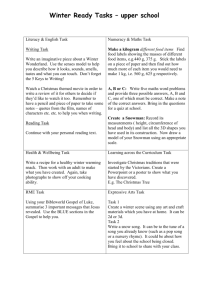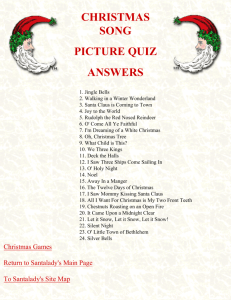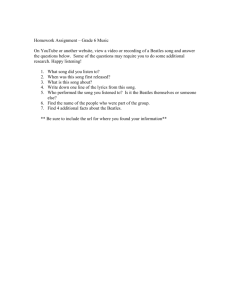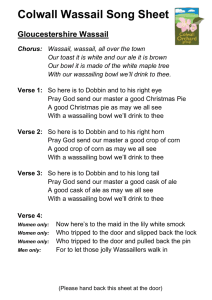printable 2015 pdf programme - Tania Opland & Mike Freeman
advertisement
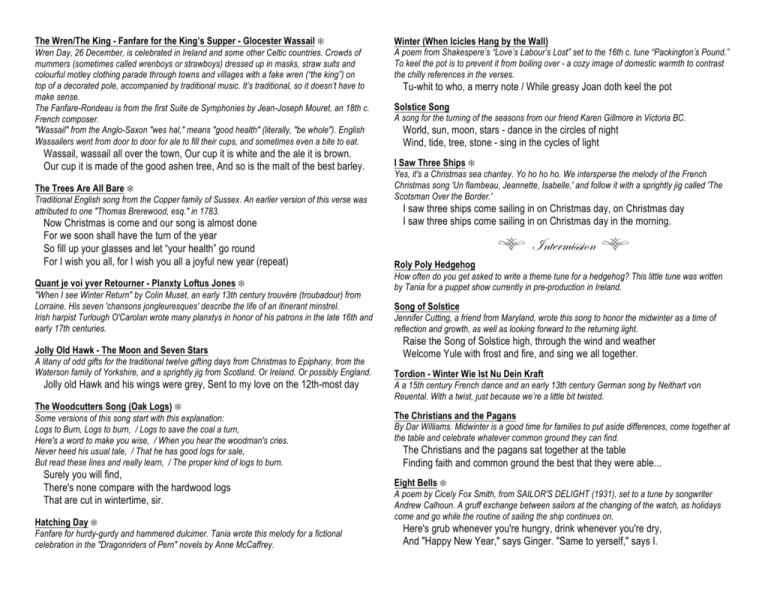
The Wren/The King - Fanfare for the King’s Supper - Glocester Wassail ❄ Wren Day, 26 December, is celebrated in Ireland and some other Celtic countries. Crowds of mummers (sometimes called wrenboys or strawboys) dressed up in masks, straw suits and colourful motley clothing parade through towns and villages with a fake wren (“the king”) on top of a decorated pole, accompanied by traditional music. It’s traditional, so it doesn’t have to make sense. The Fanfare-Rondeau is from the first Suite de Symphonies by Jean-Joseph Mouret, an 18th c. French composer. "Wassail" from the Anglo-Saxon "wes hal," means "good health" (literally, "be whole"). English Wassailers went from door to door for ale to fill their cups, and sometimes even a bite to eat. Wassail, wassail all over the town, Our cup it is white and the ale it is brown. Our cup it is made of the good ashen tree, And so is the malt of the best barley. The Trees Are All Bare ❄ Traditional English song from the Copper family of Sussex. An earlier version of this verse was attributed to one "Thomas Brerewood, esq." in 1783. Now Christmas is come and our song is almost done For we soon shall have the turn of the year So fill up your glasses and let “your health” go round For I wish you all, for I wish you all a joyful new year (repeat) Quant je voi yver Retourner - Planxty Loftus Jones ❄ "When I see Winter Return" by Colin Muset, an early 13th century trouvère (troubadour) from Lorraine. His seven 'chansons jongleuresques' describe the life of an itinerant minstrel. Irish harpist Turlough O'Carolan wrote many planxtys in honor of his patrons in the late 16th and early 17th centuries. Jolly Old Hawk - The Moon and Seven Stars A litany of odd gifts for the traditional twelve gifting days from Christmas to Epiphany, from the Waterson family of Yorkshire, and a sprightly jig from Scotland. Or Ireland. Or possibly England. Jolly old Hawk and his wings were grey, Sent to my love on the 12th-most day The Woodcutters Song (Oak Logs) ❄ Some versions of this song start with this explanation: Logs to Burn, Logs to burn, / Logs to save the coal a turn, Here's a word to make you wise, / When you hear the woodman's cries. Never heed his usual tale, / That he has good logs for sale, But read these lines and really learn, / The proper kind of logs to burn. Surely you will find, There's none compare with the hardwood logs That are cut in wintertime, sir. Hatching Day ❄ Fanfare for hurdy-gurdy and hammered dulcimer. Tania wrote this melody for a fictional celebration in the "Dragonriders of Pern" novels by Anne McCaffrey. Winter (When Icicles Hang by the Wall) A poem from Shakespere’s “Love’s Labour’s Lost” set to the 16th c. tune “Packington’s Pound.” To keel the pot is to prevent it from boiling over - a cozy image of domestic warmth to contrast the chilly references in the verses. Tu-whit to who, a merry note / While greasy Joan doth keel the pot Solstice Song A song for the turning of the seasons from our friend Karen Gillmore in Victoria BC. World, sun, moon, stars - dance in the circles of night Wind, tide, tree, stone - sing in the cycles of light I Saw Three Ships ❄ Yes, it's a Christmas sea chantey. Yo ho ho ho. We intersperse the melody of the French Christmas song 'Un flambeau, Jeannette, Isabelle,' and follow it with a sprightly jig called 'The Scotsman Over the Border.' I saw three ships come sailing in on Christmas day, on Christmas day I saw three ships come sailing in on Christmas day in the morning. 8 Intermission 8 Roly Poly Hedgehog How often do you get asked to write a theme tune for a hedgehog? This little tune was written by Tania for a puppet show currently in pre-production in Ireland. Song of Solstice Jennifer Cutting, a friend from Maryland, wrote this song to honor the midwinter as a time of reflection and growth, as well as looking forward to the returning light. Raise the Song of Solstice high, through the wind and weather Welcome Yule with frost and fire, and sing we all together. Tordion - Winter Wie Ist Nu Dein Kraft A a 15th century French dance and an early 13th century German song by Neithart von Reuental. With a twist, just because we’re a little bit twisted. The Christians and the Pagans By Dar Williams. Midwinter is a good time for families to put aside differences, come together at the table and celebrate whatever common ground they can find. The Christians and the pagans sat together at the table Finding faith and common ground the best that they were able... Eight Bells ❄ A poem by Cicely Fox Smith, from SAILOR'S DELIGHT (1931), set to a tune by songwriter Andrew Calhoun. A gruff exchange between sailors at the changing of the watch, as holidays come and go while the routine of sailing the ship continues on. Here's grub whenever you're hungry, drink whenever you're dry, And "Happy New Year," says Ginger. "Same to yerself," says I. Elf und Zwölf Our own name for these tunes, number 11 and 12 from "Terpsichore," a collection of dance music compiled by German composer Michael Praetorius in the early 17th century. Ma'oz Tzur - Candle Blessings ❄ Ma'oz Tzur is thought to have been written sometime in the 13th century. Originally sung only in the home during Hanukkah after lighting the festival candles, it has been used in the synagogue since the 19th century or earlier. These Candle Blessings are said or sung while lighting the menorah candles on each of the eight nights of Hanukkah. Winter's Return A Celebration in Music Johann Pachelbel’s Canon in D Written in the 1600’s, this now ubiquitous tune disappeared into obscurity for centuries, and didn’t come back into popularity until the 1970s. It’s been making up for lost time. The Boar's Head Carol This song, first published in the early 16th century, refers to a Yule custom that is even older, and probably dates back to pre-medieval Scandinavian traditions. Christmas ham is thought by some historians to trace all the way back to the old ritual of sacrificing a wild boar to the Norse god Freyr. Caput apri defero (The boar's head I offer) Reddens laudes Domino (Giving praises to the Lord) Noël est Arrivée A traditional French song about shepherds in the hills spreading the word that Christmas has come. But they'd rather not have to walk. The chorus means "My leg hurts. Saddle up, saddle up. My leg hurts. Saddle my horse." La jambe me fait mal, Boutte selle, boutte selle La jambe me fait mal, Boutte selle à mon cheval Ring in the New Year ❄ Ring it in, ring in the new year Bells are ringing, bells are ringing Peace and love throughout the whole year Joy! Joy! Joy! Felicia Dale -­‐ hurdy gurdy, tinwhistle, violin William Pint -­‐ guitar, octave mandolin Tania Opland -­‐ violin, recorder, dulcimer, hurdy gurdy Mike Freeman -­‐ guitar, percussion Winter's Return is a collaboration between four world touring musicians. William Pint and Felicia Dale (www.pintndale.com) join Tania Opland and Mike Freeman (www.opland-freeman.com) to perform songs of the season on a variety of instruments, including hurdy-gurdy, octave mandolin, hammered dulcimer and more. For more about these two duos see their web pages (above) or visit www.wintersreturn.com December 5, 2015: Three Rivers Folklore Society, Pasco WA December 12, 2015: Tall Timbers Concert Series, Hoodsport WA December 19, 2015: Couth Buzzard Books, Seattle WA ❄ Much of the music in this show has been rearranged for the quartet from material on our CDs: Quant je voi yver Retourner, Loftus Jones, Woodcutter's Song, The Trees are all Bare, I Saw Three Ships and Ring in the New Year all appear on When I See Winter Return (Pint & Dale). Versions of The King/The Wren, Glocester Wassail and the Candle Blessings can be found on Winter's Time (Opland, Dale, Geisler). Hatching Day on Sunset's Gold (McCaffrey, Opland, Freeman), and Eight Bells is on the mini album Eight Bells (Pint & Dale). 8 www.wintersreturn.com

